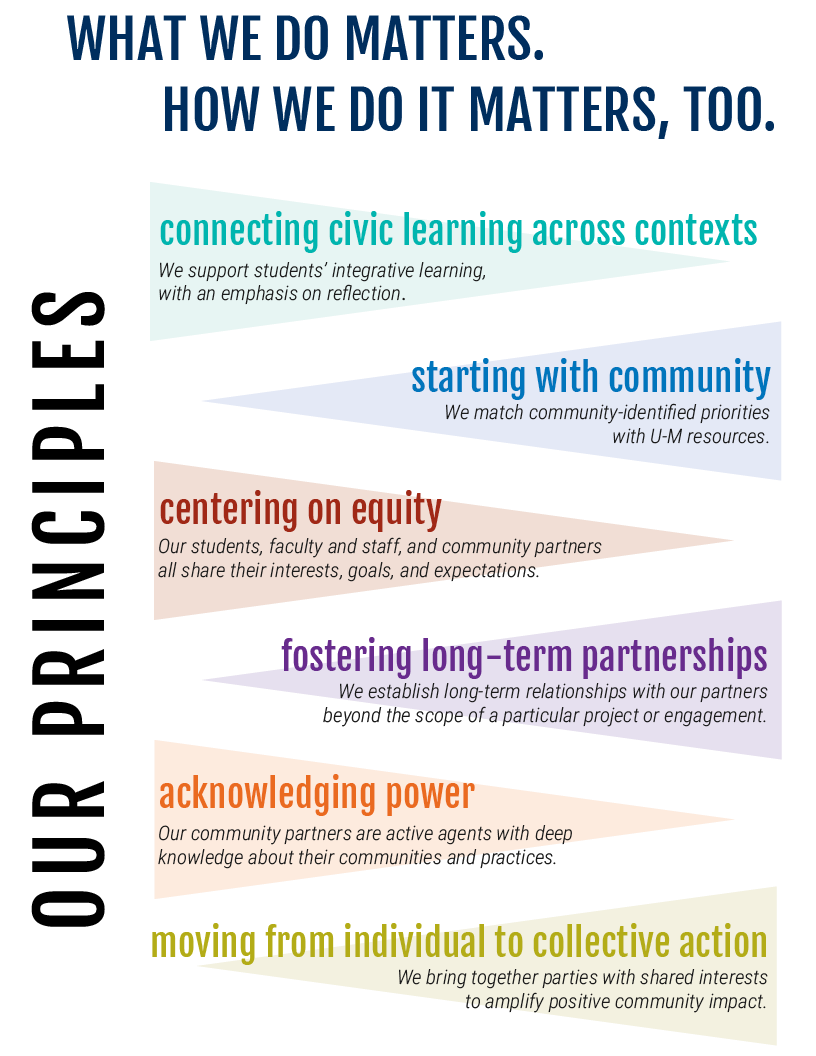Mission
We are a community and civic engagement center with a mission to cultivate and steward equitable partnerships between communities and the University of Michigan in order to advance social change for the public good. Based upon this mission, our vision is for inclusive democracy; thriving, diverse communities; and equity and social justice.
We accomplish our work by:
- Empowering students to engage in positive change through social justice education, leadership development, and meaningful civic and community engagement experiences.
- Supporting faculty and academic program staff efforts to connect socially just civic and community engagement experiences to coursework, research and programs.
- Connecting community organizations with students, faculty, and staff that are invested in positive social change.
The Ginsberg Center’s mission and purpose are premised on spanning organizational and institutional boundaries in service to social change. Recognizing our three strategic areas of focus, the Ginsberg Center is positioned within Student Life, reflecting our commitment to student education and development; we are formally connected to the Office of the Provost, reflecting our focus on faculty and academic partners, and Government Relations, reflecting our community engagement beyond campus.
Listen to our episode on the Michigan Minds podcast to learn more about our approach, how we have adapted our work during the COVID-19 pandemic, and our advice for how other community-facing organizations can adjust their responses to current circumstances.
Principles of Community Engagement
We use the following principles to guide our work:
We support students’ integrative learning across classroom, co-curricular, personal, and community settings so that students are equipped to actively participate in our communities and our democracy. Reflection is a critical component of this integration throughout the partnership process to ensure connections are made across these domains before, during and after civic engagement experiences.
Our approach centers around community-identified priorities and how we can most effectively match University of Michigan resources and expertise to those of community partners working to address these priorities.
We strive for balanced impact, where both university and community partners get their fair share of benefit. Giving faculty, staff, students and community partners the opportunity to share their interests, values, and expectations creates a strong foundation for true reciprocity and positive impact.
We focus on stewarding long-term relationships with community partners that last beyond a particular project or engagement. As a project or partnership with an academic partner concludes, we connect community partners to additional university resources so other relationships and partnerships can flourish.
Cultural humility requires a recognition of power differences and conscious attempts to balance these differences through reflection and learning. Community members are recognized as active agents, who are experts in their own right, with deep knowledge about their communities and practices, rather than as sites of academic exploration or the passive recipients of university expertise.
We support coordination, collaboration, and increased coherence by bringing together parties with shared interests to amplify positive community impact. We leverage networks and illuminate multiple pathways of connection to allow students, faculty, and staff to contribute, throughout various levels of preparedness, career stage, and expertise
Want to know more?
Read more in our current Strategic Plan, that extends the vision that has been guiding our work since 2015.
Check out our past Annual Reports:
2022 Report, 2021 Report, 2020 Report, 2019 Report, 2018 Report

